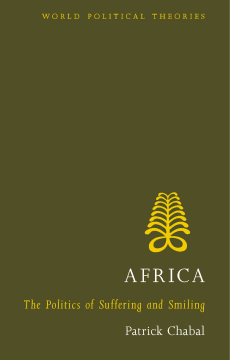
Additional Information
Book Details
Abstract
The question usually asked about Africa is: 'why is it going wrong?' Is the continent still suffering from the ravages of colonialism? Or is it the victim of postcolonial economic exploitation, poor governance and lack of aid? Whatever the answer, increasingly the result is poverty and violence.
In Africa: The Politics of Suffering and Smiling Patrick Chabal approaches this question differently by reconsidering the role of theory in African politics. Chabal discusses the limitations of existing political theories of Africa and proposes a different starting point; arguing that political thinking ought to be driven by the need to address the immediacy of everyday life and death. How do people define who they are? Where do they belong? What do they believe? How do they struggle to survive and improve their lives? What is the impact of illness and poverty? In doing so, Chabal proposes a radically different way of looking at politics in Africa and illuminates the ways ordinary people 'suffer and smile'.
This is a highly original addition to Zed's groundbreaking World Political Theories series.
'In this compassionate, elegantly written book Patrick Chabal argues that mainstream political science, political theory and economics fail to do justice to the complexities of African social life. In their place, he offers an interdisciplinary, interpretive approach that offers sensitive insights into contemporary political realities from the point of view of the people who suffer and strive through them.'
Tim Kelsall, African Affairs
'This is an important rumination on those deeper aspects of African life that most political science finds too scary, or too complicated, to investigate. Chabal asks deadly simple questions about very complex matters.'
John Lonsdale, University of Cambridge
Patrick Chabal was Professor at King's College London. He taught and researched in Africa, the USA and Europe. His publications include Cultures Troubles: Politics and the Interpretation of Meaning (2006); Africa Works: Disorder as a Political Instrument (1999); Power in Africa (1992 and 1994) and Amílcar Cabral: Revolutionary Leadership and People's War (2003).
Table of Contents
| Section Title | Page | Action | Price |
|---|---|---|---|
| About the author | i | ||
| Preface | ix | ||
| Introduction | 1 | ||
| The uses of political theory | 2 | ||
| The question of agency | 7 | ||
| The interpretation of post-colonial politics | 16 | ||
| 1 The politics of being | 24 | ||
| Origin | 26 | ||
| Identity | 30 | ||
| Locality | 35 | ||
| 2 The politics of belonging | 43 | ||
| Kin | 45 | ||
| Reciprocity | 50 | ||
| Stranger | 57 | ||
| 3 The politics of believing | 65 | ||
| Morality | 67 | ||
| Rationality | 71 | ||
| Agency | 77 | ||
| 4 The politics of partaking | 85 | ||
| Subject | 87 | ||
| Client | 92 | ||
| Citizen | 96 | ||
| 5 The politics of striving | 106 | ||
| Labour | 108 | ||
| Trade | 113 | ||
| Rent | 120 | ||
| 6 The politics of surviving | 127 | ||
| Informalisation | 129 | ||
| Networking | 136 | ||
| Migration | 142 | ||
| 7 The politics of suffering | 150 | ||
| Violence | 152 | ||
| Illness | 164 | ||
| Conclusion | 172 | ||
| The universal and the local | 174 | ||
| The question of generalisation | 178 | ||
| The pitfall of essentialism | 180 | ||
| Bibliography | 186 | ||
| Index | 210 |
